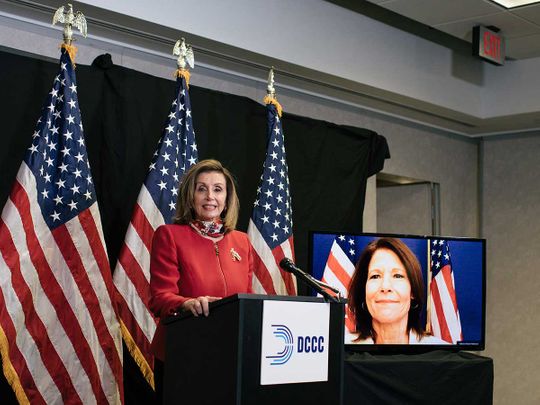
Washington: Democrats wept, cursed and traded blame Thursday during an extraordinary party confab to dissect the disappointing results of this week's elections, agreeing on little except that they needed a "deep dive" into how they had ended up with painful losses that weakened their House majority instead of the big gains they had boldly predicted.
In a caucus meeting held by telephone that was their first group conversation since Election Day, House Speaker Nancy Pelosi and Rep. Cheri Bustos of Illinois, who led the party's campaign arm, defended their efforts. Democrats expressed frustration over the loss of eight of their members - and a net loss of six seats, with 33 races still undecided - that had left them with a slimmer margin of control.
Party leaders noted that Democrats appeared on track to hold the House, thanks to hard-fought victories by incumbents in competitive districts, and that former Vice-President Joe Biden appeared headed toward a victory, according to seven people on the call who requested anonymity to divulge a conversation that was intended to be private.
‘Gutted and heartbroken’
"We did not win every battle, but we did win the war," Pelosi said.
But during the call, which lasted three hours and previewed divisions among Democrats over how to wield their power and define their message, Bustos conceded that things had gone badly awry. She said she was "gutted" and "heartbroken" by the losses.
"Something went wrong," Bustos said, blaming incorrect modeling of the electorate in polling and promising a "deep dive" on the matter. "They all pointed to one political environment, but voters who turned out looked a lot like 2016.
"We protected the lone firewall in our democracy," she added. "Now hopefully and probably with Joe Biden to take back the White House, we are now in a position to put our priorities into action because we held on to this fragile majority."
Bitter pill
It was a bitter pill for Democrats who had been ebullient only days before about their chances. On Election Day, Pelosi and Bustos had crowed about their likelihood of success. Pelosi cited predictions that the party could pick up five, 10 or even 20 seats and said she was worried about "fewer than a handful of incumbents." Both women, though, declined to offer their own precise predictions.
But by Thursday, one of the incumbents Democrats had spent heavily to defend, Rep. Debbie Mucarsel-Powell, who was defeated Tuesday night as President Donald Trump won a resounding victory in her Miami-area district, broke into tears as she spoke out to her soon-to-be former colleagues about internal divides in the party.
"We have a divided America," Mucarsel-Powell said during the call. "Continue to fight for kids or what you believe in, but if you have a problem, pick up the phone - don't tweet it out."
Rep. Abigail Spanberger, who narrowly escaped defeat Wednesday in a conservative-leaning district in Virginia that Democrats had also toiled to protect, chastised her progressive colleagues for embracing the "defund the police" movement and for not pushing back forcefully against accusations of socialism. If Democrats did not acknowledge the election results as a "failure" and change strategies, she said using an expletive for emphasis, they would get "crushed" in future elections.
To that, Pelosi objected.
"I disagree, Abigail, that it was a failure," she said. "We won the House."
Bustos, who herself won reelection only narrowly, emphasised the success of the so-called front liners, about 40 mostly freshman Democrats including Spanberger who hold seats in traditionally conservative districts. While some lost this week, most were poised for victory.
"These were seats that were in Trump country, and we were able to hold onto 30 seats that are Trump districts, and that's no small feat," she said.
Bustos also defended the Democrats' offensive push deeper into Republican territory, a move that yielded few pickups and some members said left incumbents inadequately protected.
Losses for Democrats included freshmen in swing districts - like Reps. Joe Cunningham of South Carolina, Xochitl Torres Small of New Mexico, Kendra Horn of Oklahoma and Abby Finkenauer of Iowa - but also a veteran, Rep. Collin C. Peterson of Minnesota, who leads the Agriculture Committee and has served in the House for three decades.
Surprise in Florida
One of the biggest surprises of the election came in South Florida, where Trump made significant inroads among Cuban Americans. Along with Mucarsel-Powell, Rep. Donna E. Shalala, another first-term Democrat representing the Miami area, lost.
Rep. James E. Clyburn of South Carolina, the third-ranking Democrat, said the party needed to overcome racial animus in the electorate and had to shy away from certain far-left policies that alienate key segments of voters if Democrats wanted to win a pair of Senate seats that are in play in Georgia.
"Those two seats offer us the opportunity to change the dynamics in the Senate, but we are going to have to win those seats to do it," he said. He cautioned against running on "Medicare for All or defunding police or socialized medicine," adding that if Democrats pursued such policies, "we're not going to win."
Rep. Marc Veasey of Texas warned his fellow members against anti-fracking talk, saying it was a turnoff to voters in South Texas: "They hear, 'Take away jobs.' "
But some progressives urged against turning away from liberal policies they argued had galvanized the party's core supporters.
Rep. Pramila Jayapal of Washington, a leader of the Progressive Caucus, said the "turnout of our progressive base" would be the crucial factor in electing Biden.
"This is a huge win," Jayapal said. "We didn't get the repudiation of Trump we wanted, but we turned out huge numbers of young people, brown and Black people. Don't be so quick to blame the members who have been responsible for energizing these groups, who will ultimately save the day in the race for the White House."








